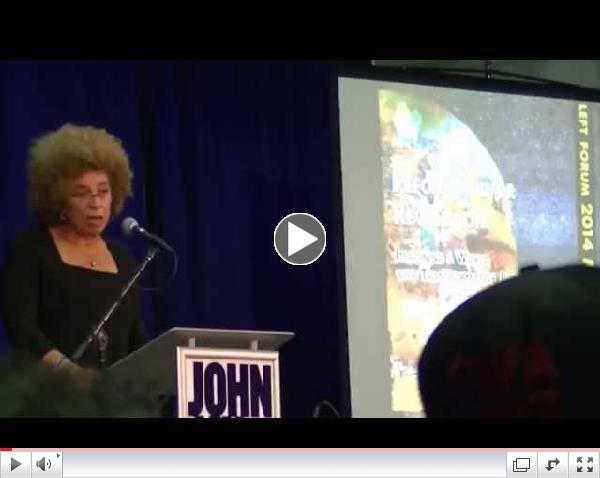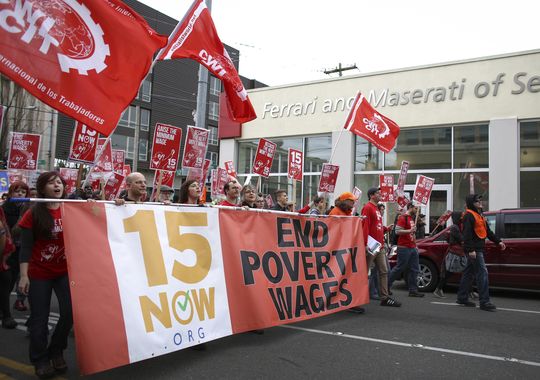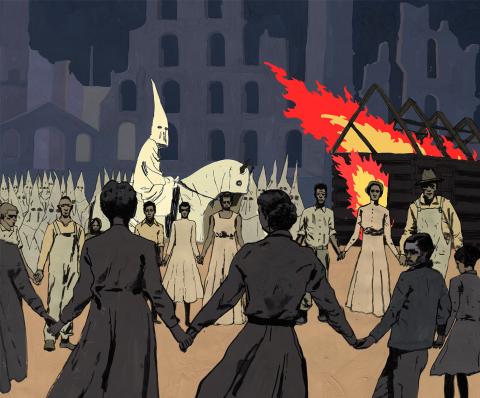 | Angela Davis Speaks
at the Left Forum |
|
 The new annual edition of our journal of discussion and analysis is now out. More than 170 pages, it includes 14 articles on strategy austerity, organizing, and the right. Cost is $10 plus shipping. Or get one by becoming a sustainer. Click the title to buy it directly. The new annual edition of our journal of discussion and analysis is now out. More than 170 pages, it includes 14 articles on strategy austerity, organizing, and the right. Cost is $10 plus shipping. Or get one by becoming a sustainer. Click the title to buy it directly.
|
Blog of the Week... 
|
 | |
Journal of the Black Left Unity Network
|
|

New CCDS Book Reporting on Vietnam
|
|
Radical Jesus:
A Graphic History of Faith  By Paul BuhleHerald Press By Paul BuhleHerald Press
|

Want to Know what CCDS has
been doing...Check it Out!
|
 Keep On Keepin' On Keep On Keepin' OnHating the 'Middle Class,' Why Socialists Run in Elections, Strategy and Tactics Slide Slow, Class and Privilege, the Green New Deal ...and other Short Posts on Tumblr by Carl Davidson
|

Edited by Carl Davidson Revolutionary Youth the the New Working Class: The Praxis Papers, the Port Authority Statement, the RYM Documents and other Lost Writings of SDS
Changemaker, 273pp, $22.50
For the full contents, click the link and view 'Preview' under the cover graphic.
|
|
By Randy Shannon, CCDS

"Everyone has the right to work, to free of employment, to just and favorable conditions of work and to protection against unemployment."
- United Nations Universal Declaration of Human Rights, December 10, 1948
I. Introduction
The "Great Recession" that began in 2007 has caused the greatest percent of job losses since the Great Depression of 1929. This crisis is the end of an era of unrestrained 'neo-liberal' capitalism that became public policy during the Reagan administration. The crisis marks a new level of instability with the growth of a global financial elite that targeted US workers and our trade unions after World War II.
|
|
Order Our
Full Employment Booklets
 |
...In a new and updated 2nd Edition
Capitalism may well collapse under its own excesses, but what would one propose to replace it? Margaret Thatcher's mantra was TINA...There Is No Alternative. David Schweickart's vision of "Economic Democracy" proposes a serious alternative. Even more fundamentally, it opens the door to thinking about alternatives. His may or may not turn out to be the definitive "successor system," but he is a leader in breaking out of the box. |
 by Paul KrehbielAutumn Leaf Press, $25.64
by Paul KrehbielAutumn Leaf Press, $25.64 | | Shades of Justice Video: Bringing Down a President, Ending a War |
|
 By Giuseppe Fiori
Verso, 30 pages
|

Essays on Mondragon, Marx, Gramsci
and the Green and Solidarity Economies |
Solidarity Economy:What It's All About

Edited by Jenna Allard, Carl Davidson and Julie Matthaei
Buy it here...
|

- Foreword by Susan Brownmiller
- Preface by Ken Wachsberger
$37.50 + $6 shipping
|
|
Discussion Documents for a Militant Movement

By Don Hamerquist
|
|
|
|
An Invitation to CCDSers and Friends...
 Socialists Need Socialists Need
More Thinking
'Outside the Boss'
We're the Committees of Correspondence for Democracy and Socialism...Do you have friends who should see this? Pass it on...Do you have a blog of your own? Others you love to read every day? Well, this is a place where you can share access to them with the rest of your comrades. Just pick your greatest hits for the week and send them to us at carld717@gmail.com! Most of all, it's urgent that you oppose war on Iran, defend voter rights, plan for 2014 races now, oppose austerity, support the 'Moral Mondays' in North Carolina, the Congressional Progressive Caucus' 'Back to Work Budget'! We're doing more than ever, and have big plans. So pay your dues, make a donation and become a sustainer. Do it Now! Check the link at the bottom... |
Bernie Sanders Unveils New Legislation for Worker-Owned Firms and Public Banks

Opening of New Era Windows Coop in Chicago
Sanders Press Release
BURLINGTON, Vt., June 2 - U.S. Sen. Bernie Sanders (I-Vt.) was joined this morning by representatives of Vermont-based, worker-owned businesses and an employee-ownership expert at a news conference to announce legislation to help workers who want to form their own businesses or worker-owned cooperatives.
Sanders said employee ownership increases employment, productivity, sales and wages. The federal government, however, has not done enough for employee ownership to realize its full potential.
"At a time when corporate America is outsourcing millions of decent-paying jobs overseas and with the economy continuing to struggle to create jobs that pay a livable wage, we need to expand economic models that help the middle-class," Sanders said. "I strongly believe that employee ownership is one of those models."
Under one bill in Sanders' package, the U.S. Department of Labor would provide funding to states to establish and expand employee ownership centers. These centers would provide training and technical support for programs promoting employee ownership and participation throughout the country. This legislation is modeled on the success of the Vermont Employee Ownership Center which has done an excellent job in educating workers, retiring business owners, and others about the benefits of worker ownership.
A second bill would create a U.S. Employee Ownership Bank to provide loans to help workers purchase businesses through an employee stock ownership plan or a worker-owned cooperative. Sen. Patrick Leahy is a cosponsor of Sanders' legislative package....(Click title for more)
|
|
Chicago Aldermen Propose Hiking Minimum
Wage to $15 an Hour, Spreading to Other Cities

By Mary Wisniewski Reuters
May 28, 2014 - A group of Chicago aldermen on Wednesday introduced a proposal to boost the minimum wage in the nation's third-largest city to $15 an hour, joining officials in other major U.S. cities who also are considering a hike.
The group proposing the wage increase is separate from a panel Chicago Mayor Rahm Emanuel named last week among aldermen, labor and business leaders to provide recommendations for raising the minimum wage.
Alderman Ricardo Munoz said 12 to 15 of the 50 council members support the proposal to raise the minimum wage to $15 per hour and he expected more to join.
The increase would match the minimum pay that fast-food workers have sought during national protests and would help Chicago's economy, Munoz said.
"Study after study demonstrates that when you put money into the pockets of consumers, they spend it," Munoz said. "They don't hoard it in their mattresses."
Illinois lawmakers on Wednesday approved an advisory referendum for the November ballot that asks whether the state's minimum wage should be raised to $10 an hour from $8.25. Governor Pat Quinn said he would sign the bill.
Seattle Mayor Ed Murray announced a plan earlier in May to raise the minimum wage to $15 an hour, making it the first major U.S. city to commit to such a high base level of pay. The proposal awaits approval by the city council.
New York and San Diego also are considering such raises.
Minimum wage increases have been considered in 38 states this year in a national push by Democrats. President Barack Obama urged Congress to raise the federal minimum wage to $10.10 per hour from $7.25, but did not get support from the Republican-controlled U.S. House of Representatives.
In a bipartisan vote on Tuesday, Michigan approved raising the minimum wage to $9.25 per hour by 2018.
Darlene Pruitt, a Chicago home healthcare worker who makes $10.65 an hour and supports the $15 proposal, said before the city council meeting that she sometimes goes to the church food pantry for help.
"I have to choose between food and medication," she said.
Emanuel's panel must make a report within 45 days. The panel includes the Chicagoland Chamber of Commerce, which opposes an increase.
"We think it puts us at a competitive disadvantage," Chamber Chief Executive Theresa Mintle said. ...(Click title for more)
|

By Ramy Khalil
Socialist Alternative
June 3, 2014 - Everybody knows you have to accept corporate money and work within the corporate-dominated two-party system to get elected, right? Not so with Kshama Sawant. In November, nearly 100,000 voters elected her to Seattle City Council - as an open Socialist - and she didn't take a dime in corporate cash!
In a huge political upset, Sawant's victory sent shockwaves through the political establishment and even around the globe. Sawant is the first independent Socialist elected in a major U.S. city in decades. Her historic breakthrough was covered by every major newspaper in the country, major TV stations, and newspapers around the world.
Now she and her Socialist Alternative political party are leading a movement to implement their main campaign pledge: raising Seattle's minimum wage to the highest in the country - $15/hour - and the movement is spreading nationally.
How did Sawant and Socialist Alternative succeed in unseating a well-connected, 16-year incumbent Democrat? Is Seattle just a Mecca of progressive politics?
"Our campaign is not an isolated event," claims Kshama Sawant. "In fact, it's the bellwether for what's going to happen in the future."
Sounds nice. But is she dreaming?
The Times Have Changed
The success of other progressives in November 2013 suggests that this isn't just a dream. Democratic candidate Bill de Blasio was elected by a landslide as New York City's mayor by promising to fight inequality and racist police brutality - much like Sawant, although he is by no means a Socialist. Ty Moore, another Socialist Alternative candidate, ran for Minneapolis City Council and came within just 230 votes of being elected. The labor movement in Lorain County, Ohio got fed up with the Democrats' betrayals and succeeded in electing two dozen "independent labor" candidates (though some maintained ties with the Democratic Party).
"It's a sign of the times," argues Kshama Sawant. "The Great Recession has provoked a backlash from the 99%. People are fed up with losing their jobs, homes, and pensions."
A new study found that the richest 1% captured 95% of the income gains of the economic "recovery" in the U.S. while working-class people saw their incomes decline. Student debt has surpassed $1 trillion, more than the total accumulated credit card debt in the country. Meanwhile, corporate politicians continue their austerity agenda of tax breaks for corporations and the richest 1% while slashing social services and jobs for working people and the poor.
In response to this growing inequality, a groundswell of resistance from working-class people keeps erupting across the globe: revolutions in the Middle East, general strikes across Europe, a labor uprising in Wisconsin, Occupy Wall Street, Turkey, Brazil... It's only a matter of time before the next mass struggle breaks out.
Transitional Method
Everyone is talking about inequality - and lots of people are eager to do something about it - but only a few activist movements in the U.S. have been able to give a popular expression to this burning desire.
The Occupy Wall Street movement was extremely successful in thrusting the issue of inequality into the mainstream, but eventually the movement began dwindling with no clear way forward. As Occupy activists got drawn into the 2012 corporate-controlled elections, Socialist Alternative argued that the movement could rebuilt by running 200 independent Occupy candidates across the country. Unfortunately, very few activists took up this call, and discussions about challenging inequality were drowned out by the corporate media, which refocused political debates around Obama, Romney, and other corporate politicians' agendas....(Click title for more)
|
By Richard D Wolff
Truthout
May 17, 2014 - Widening gaps between rich and poor, the top 1% and the rest, are heating up debates, struggles and recriminations over redistributing income. Should governments' taxing, spending, and regulatory powers redistribute income from the wealthy to others, and if so, how exactly? As opinions and feelings polarize, political conflicts sharpen.
Yet should redistribution be our focus? Thomas Piketty's recent Capital in the Twenty-first Century believes it should. He caps his analysis of how and why capitalism generates deepening economic inequality by advocating progressive income and wealth taxation. He wants to offset or reverse that inequality by redistributing income from the rich to the middle and the poor. Discussions of Piketty's work show considerable support for redistribution
Yet history has shown both its friends and foes that redistribution has at least three negative aspects. First, redistribution mechanisms rarely last. Once established, progressive tax rates, social securities, safety nets, minimum wages, welfare states, and all the other mechanisms of redistribution can be and usually are undermined. The last 40 years, and especially the aftermath of the global crisis in 2008, starkly illustrate the undoing of redistribution.
Second, redistribution is socially divisive, often extremely. When taxes not only pay (quid pro quo) for government services rendered, but also serve to redistribute income, opposition usually grows. Some taxpayers suspect they pay more and get less in public services than others. Deteriorating economic conditions that lessen capacities to pay taxes intensify resistance. That often turns into opposition to income redistribution in principle. Lower-income people get demonized as lazy welfare-dependents. Racist and anti-immigrant oppositions get drawn into the mix, and so on. Meanwhile, advocates of redistribution make ethical appeals and/or threaten that without income redistribution, deepening income inequalities endanger capitalism and the social status quo.
Third, redistribution is costly. Taxing, spending and regulating require large government bureaucracies funded by tax revenues. Opposition to taxes easily extends into opposition to bureaucracies like the IRS. Those bureaucracies usually intrude on privacy and quickly become objects of influence peddling, bribery, and abuse. ExposÚs of the latter provide further fuel to redistribution's opponents....(Click title for more)
|
Will The Working Families Party Bring
Andrew Cuomo Back into the Fold?

By Harold Meyerson Washington Post Op-Ed
June 4, 2014 - For Democrats who want their party to meet the needs of working Americans - not just split the difference between Wall Street and everybody else - last weekend's party convention in New York provides a ray of hope.
Except - bewilderment alert! - it wasn't a Democratic Party convention. It was the convention of a third party, the avowedly social democratic Working Families Party. And by skillfully playing its hand, the WFP managed to compel New York's nominally Democratic governor, Andrew Cuomo, to publicly promise to campaign for a Democratic state senate, rather than the Republican senate he had effectively supported until last Saturday.
Understanding the complexities of New York politics requires a short course in both the state's electoral fusion laws and the ambitions of its governor. In New York, minor parties can choose to endorse major parties' candidates, provided those candidates want the endorsement, or they can back candidates of their own. Since its founding in 1998, the WFP has almost invariably backed liberal Democrats, though in a very few instances, it has run its own candidates against more right-leaning Democrats.
The question before the WFP's convention was whether it should mount such a challenge against Cuomo, who is seeking reelection. Though liberal on social issues - he pushed bills through the legislature establishing same-sex marriage and strengthening gun controls - Cuomo largely dismissed the rising clamor for policies that would raise wages and diminish the role of money in politics. Like a number of Republican governors, he opposed letting cities set their minimum wages higher than the state's - a policy change that New York City Mayor Bill de Blasio requested. Cuomo said he was powerless to help enact the kind of campaign finance law that New York City adopted for its own elections, in which all contributions under $175 are matched 6-to-1 with public funds. Neither of these initiatives could get through the state's senate, where five Democratic senators had aligned themselves with the Republicans to effectively transfer control to the GOP.
The five Democrats' defection plainly suited Cuomo's purposes, ensuring that legislation upsetting to New York's business interests would never reach the governor's desk. Those interests, particularly Wall Street, have been very good to Cuomo, helping him build a campaign treasury in excess of $30 million and holding the potential to help fund a presidential bid, should Hillary Clinton choose not to run in 2016. The composition of the Senate, Cuomo accordingly insisted, was none of his business: He wouldn't back primary campaigns against the Democratic defectors.
Cuomo's willingness to bottle up key Democratic proposals rankled many of the party's rank-and-file. In the past month, polls showed Cuomo defeating a Republican in a two-way gubernatorial race this November by roughly 30 points. But when two polls added an unnamed Working Families Party candidate to the mix, Cuomo's share dropped to 38 percent, while the WFP candidate drew 23 percent (and the Republican, 24 percent). If Cuomo wanted the kind of big victory that can propel a governor toward the White House, he had to persuade the WFP to nominate him....(Click title for more)
|
By Tom Hayden
Beaver County Peace Links
June 3, 2014 - After the negotiated release of Sgt. Bowe Bergdahl, I called an old friend who spent years as a POW in Vietnam's prison camps to ask for his response. Preferring to keep his name out of the papers for the moment, he was following the situation closely. In summary though, what he said was as follows:
First, the Pentagon will debrief Bergdahl for as long as two weeks, eight hours per day, assuming they follow protocols used in Vietnam.
Second, after debriefing, the Pentagon team will take on crisis management, how to shape and control Bergdahl's narrative, whether to ignore criticism about his anti-war statements made in captivity or even to blame Bergdahl. "They did the same kind of thing with us."
Third, "so far, they are not into punishing him."
Fourth, that is because, "Public opinion so far is solidly behind him," and therefore, "It won't help to play that card." My POW friend thinks most Americans will be supportive of him whatever the facts turn out to be because, "People are sick of the war."
If the political right "tries anything, people will need to speak out" he added.
Already there is grumbling among Republicans, neo-conservatives, and within the armed forces about Bergdahl's statements, and rumors that he went AWOL. It is likely that Fox News will fan the flames.
Before a storm gathers against Bergdahl, some facts are in order.
Bergdahl could have been released in the same prisoner swap nearly three years ago, but the Republican-led opposition scuttled the deal by opposing, "negotiating with terrorists." See the New York Times account of the suspension of secret talks between the US and the Taliban in March 2012, published December 20, 2012. Those talks held in Paris included US and French officials, a Taliban delegation and Abdullah Abdullah, then a CIA-supported leader of the Northern Alliance, who currently is poised to become Afghanistan's new president....(Click title for more)
|
 | | TOO HOT FOR PBS: 'CITIZEN KOCH' Trailer |
By Andrew O'Hehir
Salon
June 4, 2014 - "Citizen Koch" is kind of a mess. But it's a mess well worth discovering for yourself - and consider the history of its production and the situation it tries to capture.
Filmmakers Tia Lessin and Carl Deal, co-directors of the Oscar-nominated Hurricane Katrina film "Trouble the Water," premiered an early cut of the film at Sundance in January 2013.
Largely filmed in 2011 and 2012 during the Wisconsin showdown between organized labor and Gov. Scott Walker, a Tea Party darling and Republican golden boy, which ended with the failed effort to recall Walker, "Citizen Koch" conveys the feeling of trying to glean meaning from yesterday's headlines, with mixed success.
Since then, Walker's star has been considerably tarnished, as has that of his East Coast cognate, Chris Christie, while the Koch brothers failed in their quest to elect a Republican president and the Tea Party wave has ebbed (or been absorbed into the Republican mainstream, if you prefer).
Then there's the reason why we're seeing "Citizen Koch" in theaters more than a year after its debut. Originally to be titled "Citizen Corp" and focused on the aftermath of the Supreme Court's Citizens United ruling, which allowed virtually unlimited corporate spending on issue campaigns, Deal and Lessin's movie was intended for PBS broadcast. But the independent production company ITVS, which is funded by public broadcasting money and supplies films for PBS' "Independent Lens" series, pulled the plug on this project last year for reasons that remain murky. Or at least for reasons that those involved want to remain murky; as Jane Mayer's New Yorker story [5] about the whole affair suggested, if you follow the money it doesn't look all that mysterious.
At some point, "Citizen Koch" acquired a new title to go along with its focus on the activities of right-wing energy billionaires Charles and David Koch, who bankrolled Walker and a host of other extremist anti-labor Republicans during the 2010 and 2012 election cycles. David Koch, interestingly enough, is a major donor to public television, and has given an estimated $23 million to PBS and its affiliates over the years. He's a trustee of WGBH in Boston, and at the time of the "Citizen Koch" brouhaha also sat on the board of WNET in New York. (In fairness, Koch's philanthropy is visible all over the place. On the day I wrote this story I walked past a New York subway ad for a performance at the David H. Koch Theater in Lincoln Center, home to the New York City Ballet.) WNET president Neal Shapiro had already gone to extraordinary lengths to placate David Koch after he was unfavorably portrayed in "Park Avenue: Money, Power and the American Dream," a film by Oscar-winning documentarian Alex Gibney that was broadcast in 2012.
Officials at ITVS have insisted that they pulled the funding for "Citizen Koch" essentially because they didn't like the film, and not because they got leaned on by Shapiro or the Koch brothers or anybody else. Lessin and Deal saw it differently: "This wasn't a failed negotiation or a divergence of visions; it was censorship, pure and simple. It's the very thing our film is about - public servants bowing to pressures, direct or indirect, from high-dollar donors." PBS ombudsman Michael Getler looked into the whole thing [6] and threw up his hands: Who can know anything for certain amid the informational wilderness of our society? He did admit that "what we may be dealing with heremay be a form of self-censorship in which officials at ITVS, and maybe at WNET and PBS itself, become wary of the impact of another PBS-distributed film critical of a hugely wealthy and politically active trustee," one who was reportedly contemplating "a new, very large gift" to public broadcasting. (Emphasis in the original.) He did not pause to inquire what the term "public broadcasting" means when it depends on the generosity of wealthy private individuals. Reading between the lines, it sounds as if PBS and/or WNET lost a whole bunch of money after the Gibney film, and were anxious to stop the bleeding. (But that's really just a guess.)
Armed with all that publicity, Lessin and Deal raised more than $170,000 on Kickstarter - slightly more than their initial PBS completion budget - and here's their movie. After all that, it's somewhat disappointing to report that "Citizen Koch" largely consists of stuff political junkies already know or will remember clearly, and that it sometimes feels like a mosaic of incompatible fragments. There are more than a few eye-opening moments: I had forgotten the improbable-but-true prank call in which a journalist posing as David Koch phones Scott Walker and discusses the possibility of planting "troublemakers" amid the pro-labor protesters at the Wisconsin Capitol building. It's not exactly a revelation at this point that Teflon populists like Walker function in political terms as wholly owned subsidiaries of corporations and the ultra-rich, but it's still disheartening to observe in action. To me, the most interesting subject of "Citizen Koch" - one the movie never quite articulates - is the perversion of the Republican Party into a thoroughly duplicitous instrument of wealth.
Lessin and Deal spend considerable time in the homes of working-class white Wisconsinites who identify as Republican but felt bewildered and betrayed by Walker's extreme union-busting tactics, which arguably had much less to do with budget-cutting than with breaking the political power of organized labor. They also devote a seemingly inordinate amount of attention to Buddy Roemer, the former Louisiana governor who ran a brief and quixotic 2012 Republican presidential campaign that went nowhere. But there's method to the madness: Roemer's an appealingly crusty character who refused to take PAC money and ran as what might be called a Teddy Roosevelt Republican, opposed to corporate power and in favor of campaign-finance reform. (This isn't in the movie, but he did a memorable walk-through [7] of Zuccotti Park during the Occupy Wall Street heyday.) Many of those Wisconsin small-town Republicans might have loved Roemer, if they'd ever gotten to hear about him. But his version of small-business libertarianism and individualism, once the philosophical bedrock of the GOP, is not permissible within that party today.
One could make the same criticism of the Democratic Party, albeit in a less exaggerated form....(Click title for more)
|
|
 THE WARS OF RECONSTRUCTION: THE WARS OF RECONSTRUCTION:
The Brief, Violent History of America's Most Progressive Era
By Douglas R. Egerton
Bloomsbury Press
448 pages, $30
By Erik J. Chaput
Providence Journal
April 6, 2014 - In early October 1864, a convention of more than 140 African-Americans from 18 states met in Syracuse, N.Y., to discuss the future of American freedom. The convention was chaired by Frederick Douglass.
With the reelection of Abraham Lincoln secure, thanks in large part to the fall of Atlanta, the delegates turned to what postwar America would look like. They demanded the "complete abolition" of slavery and "political equality." Shall "we toil with you to win the prize of free government, while you alone shall monopolize all its valued privileges?" asked the delegates of the war-torn country. In his magisterial new book, Douglas R. Egerton chronicles the Syracuse meeting, along with others that were organized throughout the South after the Civil War, in order "to establish a network of activism designed" to bring a reform agenda to the attention of Congress and a recalcitrant president.
Egerton, the author of the definitive account of the election of 1860, "Year of Meteors," has written the most important book on Reconstruction since the publication of Eric Foner's 1988 classic, "Reconstruction: America's Unfinished Revolution, 1863-1877."
"The Wars of Reconstructions" tells the story of "black veterans, activists, ministers, assemblymen, registrars, poll workers, editors, and handful of dedicated white allies" who set out to make the decades after the Civil War the "most democratic" in the 19th century. They ultimately lost their fight due to the violence of white Southerners who were determined to restore the old order. Students of Rhode Island history will enjoy the treatment of Newport restaurateur George T. Downing, who helped to found the Colored National Labor Union.
Egerton provides a concise overview of the Freedmen's Bureau, along with the American Missionary Association. The Freedmen's Bureau was tapped with numerous tasks, including education and land distribution. Prior to 1865, no Southern state had a system of public education. As the editor of the "Anglo-African" newspaper wrote as early as November 1861, land owned by Southern slaveholders should be "immediately bestow[ed]" upon the "freedmen."
The freedmen, however, did not find an ally in President Andrew Johnson, who took office after Lincoln was assassinated and serves as the villain in Egerton's narrative. Johnson's racist policies allowed white supremacists to commit "arson and murder," along with targeted "assassinations" of reformers such as Octavius Catto.
Though often a tragic story, Egerton convincingly argues that Reconstruction was a progressive period, with many policies, even if they resembled a flickering flame, surviving on. As Egerton notes, "black literacy increased four hundred percent in the thirty-five years after Appomattox." Black churches continued to grow. The black conventions continued to meet in the 1870s and '80s. Pushed by the efforts of Congressman James O'Hara, a black Republican from North Carolina, African-Americans filed lawsuits against railroads that denied them access and sometimes won.
Clearly written, engaging, meticulously researched, and often moving, Egerton's "The Wars of Reconstruction," is simply a must-read for anyone looking to understand what is without a doubt the most misunderstood period in our nation's history.
Erik J. Chaput teaches at Providence College and The Lawrenceville School in New Jersey. He is the author of "The People's Martyr: Thomas Wilson Dorr and His 1842 Rhode Island Rebellion." ...(Click title for more)
|
Greet Freedom Summer's 50th With a Red Resolution...
Become a CCDS member today!
 The time is long past for 'Lone Rangers'. Being a socialist by your self is no fun and doesn't help much. Join CCDS today--$36 regular, $48 household and $18 youth. The time is long past for 'Lone Rangers'. Being a socialist by your self is no fun and doesn't help much. Join CCDS today--$36 regular, $48 household and $18 youth.
Better yet, beome a sustainer at $20 per month, and we'll send you a copy of Jack O'Dell's new book, 'Climbing Jacobs Ladder,' drawing on the lessons of the movement in the South in the 1950s and 1960s.
Solidarity, Carl Davidson, CCDS
|
|
|